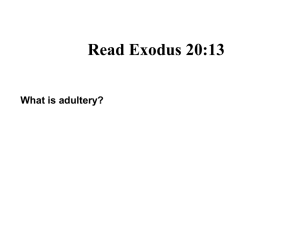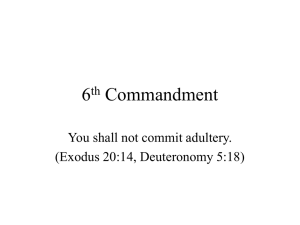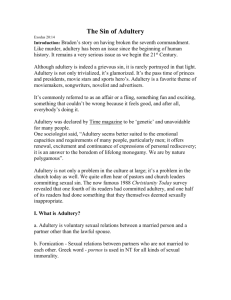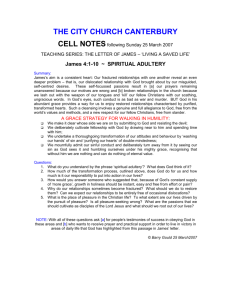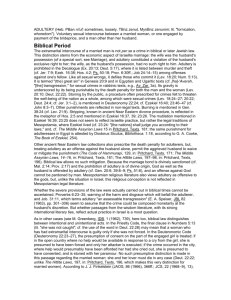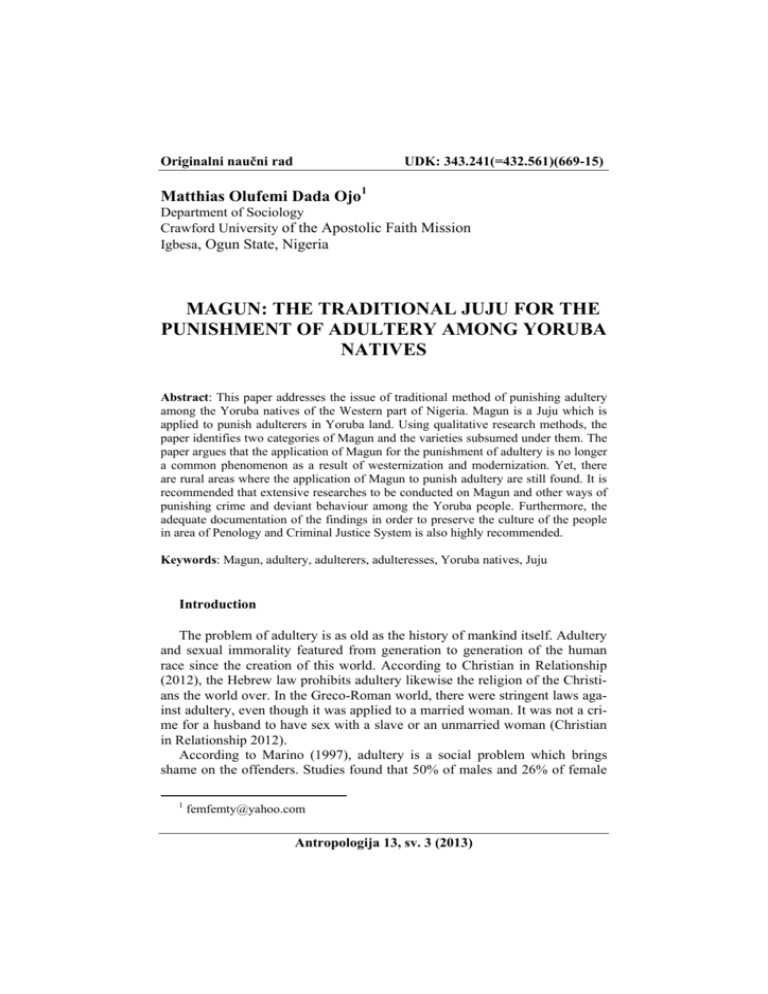
Originalni naučni rad
UDK: 343.241(=432.561)(669-15)
Matthias Olufemi Dada Ojo1
Department of Sociology
Crawford University of the Apostolic Faith Mission
Igbesa, Ogun State, Nigeria
MAGUN: THE TRADITIONAL JUJU FOR THE
PUNISHMENT OF ADULTERY AMONG YORUBA
NATIVES
Abstract: This paper addresses the issue of traditional method of punishing adultery
among the Yoruba natives of the Western part of Nigeria. Magun is a Juju which is
applied to punish adulterers in Yoruba land. Using qualitative research methods, the
paper identifies two categories of Magun and the varieties subsumed under them. The
paper argues that the application of Magun for the punishment of adultery is no longer
a common phenomenon as a result of westernization and modernization. Yet, there
are rural areas where the application of Magun to punish adultery are still found. It is
recommended that extensive researches to be conducted on Magun and other ways of
punishing crime and deviant behaviour among the Yoruba people. Furthermore, the
adequate documentation of the findings in order to preserve the culture of the people
in area of Penology and Criminal Justice System is also highly recommended.
Keywords: Magun, adultery, adulterers, adulteresses, Yoruba natives, Juju
Introduction
The problem of adultery is as old as the history of mankind itself. Adultery
and sexual immorality featured from generation to generation of the human
race since the creation of this world. According to Christian in Relationship
(2012), the Hebrew law prohibits adultery likewise the religion of the Christians the world over. In the Greco-Roman world, there were stringent laws against adultery, even though it was applied to a married woman. It was not a crime for a husband to have sex with a slave or an unmarried woman (Christian
in Relationship 2012).
According to Marino (1997), adultery is a social problem which brings
shame on the offenders. Studies found that 50% of males and 26% of female
1
femfemty@yahoo.com
Antropologija 13, sv. 3 (2013)
Matthias Olufemi Dada Ojo
had extramarital sex at least once during their life time. It was estimated that
26.7% of men and 11.6% of women, had extramarital sex. Other authors say
that between 20% and 25% of Americans had sex with someone other than
their spouses (Christian in Relationship 2012). Adultery is a common sin in
the world (Kapolyo 2005).
Adultery is an act of having sexual relations with a person other than a
marriage partner (Marriage Customs 2011). Adultery, according to the Quran,
is the involvement of a married man or a married woman in extramarital affair
(Ihmsaid n.d). In African societies, infidelity is a major reason why men assaulted wives or lovers (Hynd 2007). Erhaboh and Ikelegbe (n.d) argued that
marriage in the pre-colonial Benin society was a formidable institution upheld
with fidelity and trust. In Hindu society, whether called adultery, infidelity or
unfaithfulness; Hindus do not permit any act of sexual union outside the socially sanctioned marriage system (In -depth Tutorials and Information n.d).
Adultery is a serious and capital offence in many societies and some societies have developed cruel punishment for the offence ranging from death to
humiliation (Marriage Customs 2011). Therefore, an attempt is made in this
paper to examine the use of Magun which is a traditional Juju among the
Yoruba natives, used to punish the act of adultery. The paper critically examined this Juju and traditional issues attached to in its application towards the
punishment of adultery among these natives.
Literature review
Adultery is a common act in every human society. Kapolyo (2005), in his
paper,"The Human Condition, Through African Eyes" argued that his society
is no more or less adulterous than other peoples in this day and age. The author argued that his society was the same in sexual matters: they are not satisfied with one partner. Yet, adultery is treated with severe punishment in many
societies of the world both in the ancient times and the modern time.
In ancient Egypt, villages were insular and quite xenophobic, and adulterous relationships were seen as threatening the family alliances within the village (Marriage Customs 2011). According to In Depth Tutorial and Information
(n.d), Hinduism recognizes the moral issues of adultery that cause degradation
of family life as well as social order because a corrupt women would destroy
the family value, resulting in the destruction of her family. Ihmsaw (n.d) explained that Buddhism through Theravada Buddhist philosophy suggests refraining from extra-marital affairs which would harm the existing relationship
between the two (husband and wife). Buddhism advises on leading a happy
married life and suggested that fidelity and loyalty are the most essential attributes of a happy marriage.
132
Antropologija 13, sv. 3 (2013)
Magun...
In African societies and African Traditional Religion, adultery is totally
prohibited both by the social order and religious order which are quite inseparable. For instance, among the Edo kingdom in the Mid-Western region of Nigeria, Erhabon and Ikelegbe (n.d) argued that a Bini (Edo) man has liberty in
issue of polygamy but such liberty does not allow him to have sex with another man’s wife. In the Benin society, the matrimonial bed belongs to the wife
and not necessarily the husband. Consequently, extra marital affairs were not
counted against the male as it still is in most contemporary African societies.
Adewale (1994) argued that the kingship structure of our society makes
adultery a crime not only against the husband as an individual but also against
those corporate bodies with whom the husband is in relation. Adultery is also
an offence against the religious objects of the husband, including his ancestors. It is a criminal act against the gods, because marriage in the traditional
context is a sacred institution sanctioned by them, and any act of unfaithfulness in the matrimonial life of the couple is punishable by supernatural beings
(Adewale 1994).
Adewale (1994) submitted that among the Yoruba natives, the Ifa Oracle
warns against adultery as follows:
She destroys the members of the household of the husband; she destroys the members of the household of the concubine.
Thereafter, she destroys herself and goes on the far journey to heaven.
So declares the Oracle to the adulterous woman who is a servant of death.
In traditional African, adultery is not condoned, it is a breach of societal
and religious norms and it breeds an unhealthy and unwholesome relationship
in society, a relationship that can ruin the total well-being of the people.
Causes of adultery
The causes of adultery or marital infidelity vary from individual level to
the cultural belief systems of every society. Eysenck (2009) in his book "Fundamental of Psychology" argued that men are likely to commit adultery because of their natural preference for promiscuity and avoidance of emotional investments in their marital lives. Excessive power of man over woman in marriage is another factor which allows man to dominate his wife, even domination, in area of marital infidelity. Kung’u (2011) argued that in Kenyan society, women are considered sexual property of their men and in South Africa,
wife fell under her husband’s marital power (South African Law Commission
1996). Undue power of men over women is a known factor which makes men
not to respect their matrimonial vows.
Antropologija 13, sv. 3 (2013)
133
Matthias Olufemi Dada Ojo
Hall and Fincham (2006) indentified some causes of adultery or extra marital affairs. The two argue that individuals with permissive sexual values are
more likely to engage in infidelity, and this permissiveness is more common
among males, Africans Americans, and high educated individuals and low religiosity is correlated with extramarital sex.
According to Hall and Fincham (2006) Infidelity has also been consistently linked to sexual or emotional dissatisfaction in one’s primary relationship and that opportunities for extramarital involvement are associated with
higher like-hood infidelity.
Nelson (2010) in her dissertation explained some fundamental causes of
infidelity or extramarital affairs in the society:
(1) Women and men will seek out extra marital sex for erotic variety or
because their partner is not providing sexual opportunity. Sexual Cathexis
may not have been fulfilled in the primary relationship.
(2) Infidelity may be caused by longing for wholeness and vitalization of
the self. Infidelity may be an effort to repair early ruptures in the parental
bond and attachment. It may be as a result of a loss in the critical development
of the sensual bond between mother and infant at a nurturing stage of development.
(3) The need for new sexual excitement as a result of sexual boredom is
another factor. Boredom by real life sexual relationship is caused by repetitive
exposure to the same erotic scene.
(4) Sexual dysfunction of the partner is another factor which can cause
infidelity. Inability to achieve orgasm; lack of interest in sex or premature ejaculation or other sexual dysfunctions are factors which may stimulate infidelity between couples.
(5) Lack of physical attachment may prone a partner to infidelity. Families
no longer live in social communities with their extended families and support
systems. Most couples are isolated, and forced to connect by the internet and
through wireless connection. Couple experience separation distress when they
have attachment disruption which in many occasions can encourage infidelity.
Effects of adultery
Adultery is not without any effects in every society. According to Tembo
(2008) in his dissertation, argued that adultery is the prominent reason why
many couples divorce. Yoruba men rarely sue for divorce, and only on ground
of adultery (United Nations n.d).In Christianity, according to Adjei (2010), divorce is seemingly allowed on the ground of adultery of one or other partner
with a third person.
134
Antropologija 13, sv. 3 (2013)
Magun...
The effect of adultery can also be traced to violence and murder of spouse.
Thaler (2012) argued that sexual infidelity is one of the reasons allowed by
which a man can beat his partner, and Macdougall (2000) was of the opinion
that adultery has been seen as extreme provocation which leads to ultimate femicide. Infidelity of the husbands threatens wives’ integrity when married
men have sexual intercourse both in and out of the marital home (Ezer et al
2007) and it amounts to reducing one’s spouse to nothing and not having a say
in the marital home (Kim and Motsei 2002)
Perhaps, the most dreadful effect of adultery is the transmission of sexually
transmitted diseases, especially HIV/AIDS. Ezer et al (2007) were of the opinion that a husband who is adulterous put her wife at risk of HIV infection.
Hall and Fincham (2006) submitted that infidelity extended beyond the individuals involved in the infidelity. With the rapid spread of sexually transmitted
diseases (STDS), infidelity has become a significant public health issue. Not
only are individuals, who engage in unprotected sex outside of a committed
relationship, at direct risk of exposure to STDs, there is also emerging evidence that the primary partners of these individuals are at indirect risk of exposure to diseases such as HIV.
Nwoye (2011) claimed that infidelity is perceived as a religious offence against the earth Goddess, therefore ritual cleansing and propitiations are undertaken and when anomaly becomes rampant, divorce is often the result. Ritual cleaning and propitiations increase the financial burden of the offender but it is
compulsory that they must be done. Oluwole (2006) argued that promiscuous
man may waste his economic investments as a result of his adulterous life:
Iwori wowo, wowo, Iwori wosu wosu, Iwori wosu ko to wawo Oyinbo. A dia fun
Alarobo, abu fun Baba oloko.
Baba oloko n ta ja a re; awon Alarobo n ra a. Baba oloko wa n wo Idi Alarobo kowo oja t’o n ta mo titi o fita oja nitakuta tan. Ni won ba n korin fun Baba oloko: E o
wowo loko, e o wowo l’oko. E n wodi Alarobo,E o wowo l’oko.
Meaning: A man should learn self discipline before going into business like the
whites. This was the mistake of the farmer who was a marketer. Instead of concentrating on the sale of his goods he was more interested in having sex with female buyers.
In the end he sold at a loss and was ridiculed for being more mindful of sex than ensuring that his investment is secured. (Oluwole 2006)
Punishement for adultery
There is a stern punishment for the act of adultery in every society. In some societies, the punishment for the woman is harsher than her partner in the
crime (Marriage Custom 2001) and in some societies the man takes a severe
penalty (i.e. death) as a punishment for adultery. Anoko (2008) argued that in
Antropologija 13, sv. 3 (2013)
135
Matthias Olufemi Dada Ojo
Guinea, Custom allows a man to kill or abuse his partner or a woman in his
family, for real or supposed immoral behaviour. In some societies, stoning –
to-death is a punishment for the crime of adultery (Tamale 2013). This is in
accordance with Islamic law derived from Quran and Hadiths, and Judaism
religion derived from the Jews Old Testament. Enslavement in some societies
is a punishment for the act of adultery. Adultery is a charge which offered the
right to sell the offender into slavery (Rodney 1970). Very similar to enslavement as punishment is banishment. Cheating in Relationship (2012) explained
that the ancient Roman society punished adultery with banishment. The two
guilty parties would be sent to different islands and part of their property would be confiscated. In modern time, arrest, imprisonment and deportation may
serve as punishment for the act of adultery. For instance in Kuwait: any married person who has consensual sexual relations with a person other than his
or her spouse can be punished up to five years’ imprisonment (Mughni 2010)
In some pre-colonial west African countries, husbands demand a fine for his
wife’s infidelity from the co-respondent (Nassau 1904) and in some modern
post colonial societies, customary law awards compensation for case of adultery
presented by a particular husband to the court (Jok et al 2004). Hence fine and
the payment of compensation serve as punishment for the act of adultery.
In Benin kingdom, the punishment for adultery may involve the death of the
children of the adulterous wife if the act of adultery was not confessed (Erhahon
and Ikelegbe n.d) and in Ibibio tribal society Ekpo Nka Owo (the Ibibio ancestral spirit or ghost of adultery) regulated, checked, exposed, and punished infidelity in order to maintain the sanctify of marriage among the Ibibio (Nwahaghi
1996). Hence gods, spirits or ghosts can also punish adultery.
In ancient Egypt, the wife of a royal scribe committed adultery whereby
Pharaoh ordered her to be seized and burned to death (Reshafim n.d) and the
same punishment of setting ablaze was common during the Old Testament Biblical time (Abasili n. d).
Marriage Customs (2011) runs a list of the punishment for adultery in some selected societies:
(1) In Hindu society, if a man committed adultery with woman of higher
caste, he would be put to death and if the caste of the women is equal or lower
than his, his possession would be confiscated; he would be castrated and carried around on ass. If a man from higher caste commits adultery with a woman from lower caste, the adulterous man would only pay fine and if a Brahmin, or a priest, would only suffer having his hair cut.
(2) In part of New Guinea, capital punishment was used for adultery and in
some occasions, disfigurement of the adulterer was another common punishment.
(3) Among several North American India groups, an aggrieved husband
would bite or cut off the nose of the guilty woman while among the Creeks
136
Antropologija 13, sv. 3 (2013)
Magun...
and Chittagong Hill tribes; the ears of a woman found guilty of infidelity would be cut off.
(4) Among Muskogees, adulterers would be forced to remain celibate for
the period of four full moons.
(5) The ancient laws of Sweden and Denmark allowed aggrieved husband to
kill his wife and castrate her lover. In Upland-Lag, an old Swedish provincial law,
an adulterous woman had to pay a fine of forty marks. If she was unable to pay she
would lose her hair, nose, and ears as punishments. Sometimes, it seems they were
intended to make the guilty woman unattractive to her lover or any other person.
(6) Finally, in central African Lele people, if a woman dies in childbirth,
she is believed to have committed adultery and her purported lover would be
liable to pay a blood debt.
Among the Yoruba natives of West Africa, the adulterer may be physically
attacked, be made to be impotent or punished with death through deadly Juju
called "Magun" (Adewale 1994) and a man who tries adultery, stands the risk
of death through "Magun" (Adeniyi 2011).
Magun: Dreadful and Deadly Juju for the Punishment of Adultery
among Yoruba Natives
Magun, which in a literary Yoruba language means "Do not climb" is a dreadful and deadly Juju usually employed by offended husbands to punish the
adulterous men having illicit sexual affairs with their wives. There are many varieties of "Magun’’ in Yoruba land. The varieties exist because the knowledge
of Juju varies from one person to another and people are stronger than one another when it comes to traditional Juju and Voodoo. Among the Yoruba natives,
there is a popular saying that: ‘’what is infinity is what is called Juju; where the
knowledge of one man ends in Juju that is the beginning of another man’s
knowledge’’. However, as many as the varieties of "Magun" are, the potency of
this Juju can be classified into two: one which kills immediately an adulterer
has sex with the adulterous woman and the second would defer its action till
when an adulterer eat a particular food or do a particular thing which would immediately activate the potency of this Juju and kill him afterward. This type (the
second type) is like a timed bomb waiting to be exploded.
There is one thing which is a must for the two types of this Juju when they
are to be used: the woman who is suspected of the act of adultery with another
man must cross over or walk over the Juju that must be placed on the floor
(usually at the door entrance) discreetly without the woman knowing it . The
Juju would then be removed quickly from floor, not to allow a situation whereby the woman would walk or cross over it the second time, for this would
destroy the potency of the Juju.
Antropologija 13, sv. 3 (2013)
137
Matthias Olufemi Dada Ojo
The category of ‘Magun’ that works immediately the adulterer has the carnal
knowledge of the adulteress would instantly kill such adulterer. There is a type of
this ‘Magun’ that would make such adulterer to be foaming from mouth as soon as
the potency of this Juju is activated and a type would make the adulterer to be drinking water until when he dies. Another type involves acrobatic displays. This
type would make the adulterer to be somersaulting (usually for three times). The
third time of somersault would eventually lead to the death of the adulterer. However, if people were to be around, they often come to the rescue of such adulterer by holding him down, so that he would not somersault the third time.
The second category of ‘Magun’ is the one who’s its potency would be activated only when the victim eat a type of food or do a particular thing that
would release the locked up potency of this Juju. Under this category, varieties exist and each variety is usually attached to eating some food or performing
some actions that would activate its potency. For instance, a type of "Magun"
under this second category forbids the eating of "Okro Soup" . Another one
forbids the eating of a local variety of banana called "Omimi’. For the variety
which forbids performance of some actions, there is a type which forbids crossing a river and another forbids the crossing over a gutter .
The forbidden food or forbidden acts attached to this type of "Magun" would not be known to the adulterers and they would not have the knowledge
that they are already under the spell of "Magun" having had sexual intercourse
with the adulteresses. The spell would continuously be on them, waiting for
the time they would eat or do forbidden things that would activate such spell
and kill the adulterers in the process. Ironically, such adulterers would be having appetite for those forbidden food that would activate the potency. Again,
a variety of "Magun" under this category would only cause a prolonged strange sickness that would eventually kill e the adulterer.
Both categories of "Magun" usually involved the preparation of some leaves, roots, animals and some traditional material things. All the materials prepared together would be soaked in a fruit, especially in a paw paw for seven
days, with a local beads or chain inside that would be eventually placed on the
floor for a suspected but unsuspecting adulteress to cross over. Some may be
done using a stick of broom. Apart from being soaked in a pawpaw, some
may be buried in a ground or hid in a particular tree for usually seven days.
After the completion of seven days, the Juju can then be removed and placed on the floor for the suspected adulteress to walk over i. It must be done
secretly without her knowing it. The Juju would then be removed immediately
she had walked over it. Any man who later has the carnal knowledge of the
woman afterward (even the husband of the woman) would be expected to die
of "Magun". Therefore, the husbands who have placed "Magun" on the body
of their wives usually refrain from having sex with those wives until "Magun"
eventually kills the men committing adultery with their wives.
138
Antropologija 13, sv. 3 (2013)
Magun...
In Yoruba land, therefore, a virtous man would not go around committing
adultery with his neighbours’ wives. Polygamy is allowed and such marriage
type is expected to take care of the sexual urges of the Yoruba men. Hence,
men who die as a result of "Magun" would not be pitied and their death is treated with no sympathy.
Conclusion and Recommendations
Modernization and Westernization have seriously reduced the rate of using
"Magun" to punish adultery among the Yoruba people. Instead of using "Magun" to punish adultery, Yoruba men prefer divorcing their adulterous wives.
Hence the age, of modernization would view the act of punishing adultery
with ‘Magun’ as barbaric and primitive. The act would be considered as wickedness in the present day.
However, the experiences show that the act of punishing adultery with
‘Magun’ still remains a constant phenomenon among the Yoruba people living in rural areas. Experiences show that most Yoruba natives living in villages throughout the Yoruba land are still using "Magun" to punish the act of
adultery. The reason for this is that the Yoruba natives living in the villages are very close to the traditions of the land and they have, available, the materials to prepare "Magun" for the punishment of adultery. Hence, the act of adultery and other sexual immoralities are common in the urban areas than the rural areas.
Magun’s application as a punishment for adultery is not a common occurrence nowadays. However, it still remains a potential Juju for the punishment
of adultery in Yoruba land. It is a dreadful and deadly Juju which every Yoruba man fears. It is a Juju which keeps in check the act of adultery among the
people.
This paper recommends further extensive researches on the application of
"Magun" as a punishment for adultery among the Yoruba natives. The researches should centre on : the types of "Magun" not covered by this paper, the other processes involved in making this juju and the opinion survey on whether
Magun should be used to punish the act of adultery or not, especially in this
modern day. Finally, we recommend further investigations into the other cultural ways of punishing crime and deviant behaviours among the Yoruba natives and the proper documentations of those findings to serve as a way of preserving the Yoruba culture in area of penology and Criminal Justice System
for the coming generations.
Antropologija 13, sv. 3 (2013)
139
Matthias Olufemi Dada Ojo
References and Resources:
Adjei, Christine Nanacy. 2010. The Bible and Modern Culture in Africa. Social
Sciences Research Network 3(1):1-13.
Anoko, Juliene N. 2008. Gender Inequality in the Protected France Areas of
West Africa. France: UCN and FIBA.
Abasili, Alexander Izuchukwu. n.d. African Woman: A Contextual Reading of
Genesis 38. [retrieved from on 03/05/2013]
Adewole, S.A. 1994. Crime and African Traditional Religion. Orita XXVI (1
and 2): 54-66.
Adeniyi, Tola. 2011. Culture Identity and Emancipation: Challenge to the
Yoruba Race. Key Note Address Delivered at the Olokun Festival Held at
Sultan Beach, Badagry on Friday October 28.
Cheating in Relationship. 2012. Adultery [retrieved from www.cheating in
relationship on 03/05/2013]
Erhabon. Ivie B and Ikelegbe, Onovughe. n.d Issues and Practices Depicting
Punishment of Wives in the Benin Kingdom in the Pre-Ccolonial Era.
[retrieved from www.interdisciplinary.net on 03/05/2013]
Eysenck, Michael W. 2009. Fundamentals of Psychology. Slovenia: Psychology
Press- Taylor and Francis Group.
Ezer, Tamar, Elizabeth Glasford, Elizabeth Hollander, Lakeisha Poole, Grant Rabenn and Alexandria Tindall. 2007. Divorce Reform: Rights Protections in the
New Swaziland. The Georgetown Journal of Gender and the Law VIII: 883992.
Hynd, Stacy. 2007. Deadlier than the Male? Women and the Death Penalty in
Colonial Kenya and Nyasaland (1920-1957). Stichproben-Wiener Zeitschrift
fur kritische Afrikastudien 12(7): 14-33.
Hall, Julie H. and Frank D. Fincham. 2006. Relationship Dissolution Following
Infidelity. In M. Fine and J. Harvey (eds.). The Handbook of Divorce and
Romatic Relationship Dissolution. New Jersey: Routledge.
Ihmsaw. n.d. Cohabitation, Marriage and Remarriage Patterns in Africa: A
Religious Viewpoint [retrieved from www.ihmsaw.org on 03/05/2013]
In Depth Tutorials and Information. n. d. Adultery in Hinduism [retrieved from
www.what-when-how.com on 03/05/2013]
Jok, Aleu Akechak; Robert A. Leitch and Carrie and Hum Vandewint. 2004.
A Study of Customary Law in Contemporary Southern Sudan. Sudan: World Vision International.
Kapolyo, Joe M. 2005. The Human Condition: Christian Perspectives through
African Eyes. Urban Theology 3(2): 34-45.
Kelly, Sanja and Julia Breslin (eds.). 2010. Women’s Rights in the Middle East
and North Africa: Progress Amid Resistance. New York: Freedom House.
140
Antropologija 13, sv. 3 (2013)
Magun...
Kim, Julia and Mmatshilo Motsei. 2002. "Women Enjoy Punishment": Attitudes
and Experiences of Gender-Based Violence among PHC Nurses in Rural
South African. Social Science and Medicine 54: 1243-1254.
Kung’u, Christine Wanjiru. 2011. Crimilization of Marital Rape in Kenya. A
Thesis Submitted in Conformity with the Requirements for the Degree of
Master of Law, Faculty of Law, University of Toronto.
Marino, Jennifer Rose. I997. Adultery Is Not Simply ‘A Military Thing’
[retrieved from on 03/05/2013]
Macdougall, Lorraine .2000. A Qualitative Study of Intimate Femicide. Thesis
Submitted in Partial Fulfillment of Requirements for the Degree of Master
of Social Sciences (Social Work), Rhodes University, East London.
Marriage Customs. 2011. Adultery [retrieved from on 03/05/2013]
Nwahaghi, Felix N. 1996. Fidelity in Ibibio Marriage: The Role of Ekpo Nka
Owo- the ancestral spirit of adultery. Africana Marburgensia: Sonderheft
16:48-59.
Nassau, Robert Hamil. 1904. Fetichism in West Africa. United Kingdom:
Charles Scribners Soon Publisher [retrieved from on 03/05/2013]
Nwoye, Chinwe M.A. 2011. Igbo Cultural and Religious World View: An
Insider’s Perspective. International Journal of Sociology and Anthropology
3(9): 204-317.
Nelson, Tammy. 2010. Erotic Recovery after Infidelity: Restoring the Sexual
Template through Sex Therapy. A Dissertation Submitted to the Faculty of
the American Academy of Clinical Sexologists in Candidacy for the Degree
of Doctor of Philosophy in Clinical Sexology.
Oluwole, Sophie B. 2006. Public Health and the Individual Right to Sexual
Pleasure and Choice Sexuality in Africa 3(2): 6-8.
Rodney, Walter. 1970. A History of the upper Guinea Coast (1545-1800).
Oxford: Oxford University Press.
Rehafim.n.d Infidelity [retrieved from on 03/05/2013]
South African Law Commission. 1996. Harmonization of the Common Law and
the Indigenous Law (The Application of Customary Law: Conflict of Personal
Laws) [retrieved from www.uct.ac.29/law/saic/salc.htm on 03/05/2013]
Tamale, Sylvia .2013. Exploring the Contours of African Sexualities – Statutory, Customary and Religious Laws. A Paper Presented at the Conference
on "Law and Religion in Africa: Comparative Practices, Experiences and
Prospects" held at the University of Ghana, Accra: January 14-15.
Thaler, Kai. 2012. Norms About Intimate Partner Violence among Urban South
Africans: A Quantitative and Qualitative Vignette Analysis. South Africa:
Centre for Social Science Research.
Tembo, Langwell. 2008. The Art of Maintaining a Successful Marriage in the
Seventh Day Adventist Church, Lysant Molly. A Dissertation Submitted in
Antropologija 13, sv. 3 (2013)
141
Matthias Olufemi Dada Ojo
Partial Fulfillment of the Requirement for the Degree of Master of
Theology in the Subject of Practical Theology, University of South Africa.
United Nations.n.d The Yoruba Family. [retrieved from www.unu.edu on
03/05/2013]
Pimljeno: 12.04.2013.
Prihvaćeno: 09.11.2013.
Matthias Olufemi Dada Ojo
MAGUN: TRADICIONALNA VRADŽBINA ZA KAŽNJAVANJE
PRELJUBE KOD NATIVNOG JORUBA STANOVNIŠTVA
U radu se govori o tradicionalnom metodu kažnjavanja preljube kod nativnog
Joruba stanovništva u zapadnom delu Nigerije. Magun je vradžbina koja se
koristi za kažnjavanje preljubnika u zemlji Joruba. Korišćenjem kvalitativnog
istraživačkog metoda, u radu su izolovane dve kategorije maguna i varijacije
koje postoje u njihovim okvirima. U radu se tvrdi da primena maguna za kažnjavanje preljube više nije uobičajen fenomen, što je posledica vesternizacije
i modernizacije. U ruralnim oblastima magun opstaje kao način kažnjavanja
preljubništva. Preporučuje se ekstenzivno istraživanje koje bi se bavilo magunom i drugim načinima kažnjavanja zločina i devijantnih ponašanja kod Joruba i adekvatno dokumentovanje nalaza kako bi se očuvala znanja koja ove populacije imaju o pitanjima nauke o krivičnom pravu i krivčnopravnog sistema.
Ključne reči: magun, preljubništvo, preljubnici, preljubnice, Joruba, nativno
stanovništvo, vradžbine.
142
Antropologija 13, sv. 3 (2013)

